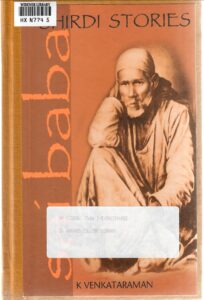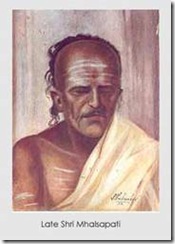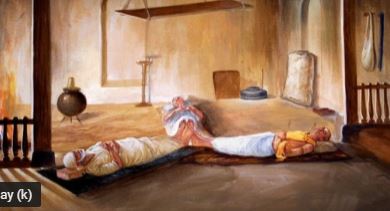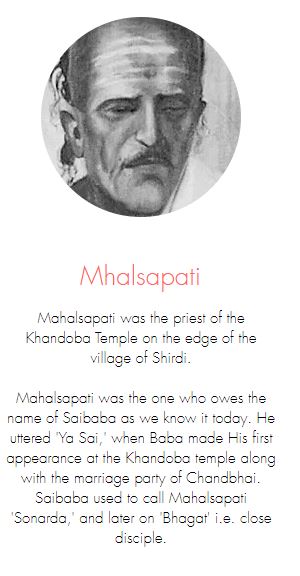
Shirdi Stories
Krishnaswamy Venkataraman
Srishti Publishers, 2002
***
“The Fakir does not intend to give you realization – in this birth”
 Mhalsapathi, or Bhagat as Sai Baba called him, had a feeling he could not explain. It was not a complaint, still less a grouse. It was not a grievance. It was just this question. Why was it that in spite of having been near Sai Baba for so long, he still did not get jnana?
Mhalsapathi, or Bhagat as Sai Baba called him, had a feeling he could not explain. It was not a complaint, still less a grouse. It was not a grievance. It was just this question. Why was it that in spite of having been near Sai Baba for so long, he still did not get jnana?
His association with Baba was the longest among the devotees. He had been with Baba for some fifty years. He stayed practically the whole day in the Mosque, except for going home for his meals. He slept in the Mosque along with Baba, both sharing his upper cloth as a bedsheet, a privilege which the other sleeper in the Mosque, Tatya Patil, did not have. When Baba arrived at Shirdi with a marriage party, it was Bhagat who saw the spiritual resplendence of young Baba and said to him, “Come, Sai”. Baba’s name and ancestry were not known at that time nor were they known precisely later. It was Bhagats salutation “Sai”, a term denoting a saintly person, that endured.
Originally Baba stayed under a margosa tree. Later, he moved into the dilapidated Mosque, after Mhalsapathi had shown his reluctance to let him sleep in the Khandoba temple. Mhalsapathy had been the priest of the temple. Bhagat, the appellation that Baba gave him, actually meant a priest.
In the Mosque, Baba used to sleep by himself. He apparently slept on a narrow wooden plank, suspended from the ceiling at a height. That rectangular plank had lamps placed in the four corners. People got curious how he slept on such a narrow plank and how he got on to it in the first place. When they tried to watch him secretly, Baba got angry and broke the plank. Later, Bhagat’s sleeping in the Mosque started.
Bhagat was a goldsmith by birth and profession. However, whatever he touched did not turn into gold. He was poor. Whatever land he had was barren. He was religious all his life. Though he was the priest of the Khandoba temple, he had instant reverence and attachment to Baba.
Bhagat was the first person who had started worshipping Baba. He would apply sandal paste to Baba’s forehead and feet, as one would to an idol of worship.
All this was more than enough for one to boast of. But Bhagat was not of that type. He never even thrust himself in conversation. Even the momentous occasion of Baba’s ‘temporary death’ he remembered, not with a feeling of personal triumph but with a sense of relief and elation that Baba did indeed come back.
It had been a full moon night when Sai Baba called him and said, “Bhagat, in a short while, I will be leaving this body. Let my head rest on your lap. I will be back in three days. My body should not be removed and disposed of in the meantime”. Bhagat was dumbfounded. Sai Baba lay down, with his head on Bhagat’s lap. The body became still and the breath stopped.
There were all kinds of pressures on Bhagat and other devotees to remove the body. Bhagat never moved an inch and kept the head on his lap. He had>unwavering faith in Babas words. He was firm in pointing out that the body had shown no signs of decomposition and that nothing should be done till the three days mentioned by Baba were over. The authorities on their part sensed the mood of the villagers and kept quiet.
When Sai Baba yawned and sat up in the morning of the third day, there was overwhelming relief and boundless joy all round. Bhagat could not control his tears. Baba looked at him with affection, laced with a hint of amusement.
Baba had always affection for Bhagat. He showed his affection in various ways. Whenever Bhagat went out of the Mosque, Baba would say, “Alright, go carefully, I will be with you”.

But the problem was Bhagat never went home except for his meals. He slept the night in the Mosque along with Baba. Baba, he and Tatya Patil would sleep in a strange way, with their heads in different directions and their legs converging. Baba would not really let Bhagat sleep. Bhagat was to see that Baba’s heart never varied in its beat; its rhythm was the chant of the holy name, Baba had said. If the beat changed to a more normal rhythm, Bhagat was to wake him up.
Bhagat had lost his son. Baba said another son would be born to him. On Baba’s insistence, Bhagat had to be forced to go home and sleep at nights. This went on for a year or so. A son was born.
Bhagat never asked for money from Baba nor got any, though Baba gave daily from his dakshina, money to Tatya, Bhagoji and some others. Nor did Bhagat expect money from Baba’s devotees who would have gladly given him any amount he wanted. There was an occasion when the Princess of Baroda came to pay obeisance to Baba and placed before him expensive gifts and some gold coins. Baba refused to touch them. The Princess turned and looked at Bhagat, implying that he could take the coins. Bhagat refused, without any hesitation. He had long forgotten the goldsmith in him. He well remembered what Baba had once said: “What God gives is never exhausted and what man gives never lasts.”
Some people referred to Bhagat as one of Baba’s main disciples. Bhagat stoutly declined any such appellation. He was just a humble devotee. Talking of disciples, Baba himself had once spiritedly asked, “Who dares to call himself my disciple?” Baba had gone on to explain the nature of a true disciple and of the guru’s grace. All one needed to do was to surrender to one’s guru. He described his own experience – looking after the guru’s needs in every possible way. That was enough sadhana.
There was no doubt that Bhagat was a true devotee. When Baba had advanced in years, it was he and Tatya who usually walked by Baba’s side and supported him when necessary. This was the case during Baba’s daily trip to the Lendi. It was also often the case when the practice of Baba sleeping on alternate days in the Chavadi started.
Bhagat finally had a chance to ask his question. During the Chavadi procession one night, the music and bhajans were at their zenith. It was opposite the Maruthi temple. Bhagat went into a frenzy. He let go of Baba’s shoulder. He swerved into the bhajan party in front and started singing and dancing. It was a strange spectacle – the tall dark thin frame with its shaven head and flying tuft moving in a rhythm born out of ecstasy rather than of any particular school of dance. Baba stood and waited till Bhagat had finished the dance and come back to his side.
Back in the Mosque the next morning, Baba remarked, “Bhagat, you left me last night to do your dance”. There was a twinkle in Baba’s eyes. “You forgot yourself in devotion, did you?”
Words came out of Bhagat’s mouth instantly. “Baba, you know you are my refuge, but you have not been kind to give me realization.”
Baba smiled compassionately and put a hand on Bhagats shoulder. “Bhagat’, he said, “I know. The Fakir”, he pointed his hand upwards, “does not intend to give you realization – in this birth”.

When Baba first entered Shirdi, it was Mhalasapati who addressed Baba as “SAI” which became his name.Baba lay down lifeless on his lap in 1886. Next day when people saw the lifeless body of Baba, they thought that he was dead and must be buried and other inquest formalities also were done against the wish of Mhalsapati. But Mhalsapati would not budge an inch and also told them that there would not be any harm in waiting for three days stated by Baba and also expressed his confidence that Baba’s words would come true.)
When Sai Baba entered Shirdi village Mhalasapati welcomed him as “Ya Sai” or “Aao Sai” (meaning “Welcome Sai”) and with that name he became known as Sai Baba. Mhalasapati introduced to Baba his friends, Kashiram Shimpi and Appa Jagle who were both very generous and devout people and all the three were interested in welcoming to Shirdi village any holy and pious person. Incidentally, some information about Kashiram and his business was trading in cloth. It was Kashiram’s practice to give money to Baba whenever it was needed. At a later stage, he started placing his entire income before Baba. He used to affectionately insist that Baba should give back whatever money He wished. Later on, Kashiram was in financial difficulties. At that time, Baba started continuously demanding money from him. Due to this insistence, Kashiram lost his feeling of false pride and his monetary situation started improving. In this manner, his false pride disappeared. Kashiram placed his body, soul and money in devotion of Baba.
Mhalasapati’s full name is Mhalsapati Chimnaji Nagare. Though particulars about his birth are not known, it is estimated that at the time of his death he was about 85 years old. He was a goldsmith by caste and right from his forefathers, all his families had resided at Shirdi.
His family Deity was Khanderai. Because of this, he was a dedicated follower of Khanderai of village Jejuri in Pune district. At least once every year, he went on a pilgrimage to visit Jejuri temple. By nature, he was disinterested in worldly things. He managed his household expenses by carrying on the business of a goldsmith. However, later on when his business was not doing well, he started supporting his family by collecting alms as advised in a dream vision by the God. After he placed his entire faith in Sai Baba, he totally gave up all the worldly pleasures.
B.V Narasimha Swamiji declared that Mhalsapati was the pioneer of Sai pooja and the Sai movement. Mhalsapati had four daughters. Their names were – Janakibai, Seetabai, Rakhumabai and Vithabai. They were married to grooms from Asnagaon. Dochale, Dorhale and Sei respectively. Mhalsapati also had one son and his son died at an early age in 1880s. Because of this, Mhalsapati further lost his interest in worldly things.
Baba had piety on Mhalsapati and advised him several times to go and sleep in his house so that he would have a second son. As he lost interest in the worldly matters, he did not follow Baba’s words. In fact he had no desire to have a son. But on one occasion, Kashiram Shimpi on Baba’s orders forcibly took Mhalasapati to his house and locked him up inside the house on one Krishna Jayanti day. Like this Mhalasapati slept at home exactly for one full year and got a son due to the blessings of Baba in 1897. As suggested by Baba, he was named ‘Martand’. Martand was very close to Baba and in the side picture, one can see Mhalasapati, Shama and child Martand in the lap of Baba. Martand was deeply involved in the propagation about Baba and later on became Martand Maharaj. Martand attended the First All India Sai Devotees’ Convention which was held for four days in May, 1946 in Mylapore, Madras under the aegis of B.V.Narasimhaswamiji who became the apostle of Baba. More than two hundred delegates and devotees attended the convention. This was a unique convention. Martand raised his own family of sons and daughters and died in 1986.
Baba used to call Mahalsapati as “Sonarda” and later on as “Bhagat” meaning a close disciple. Since the time Baba went to stay in Masjid, Mhalsapati and Tatya Patil started sleeping with him. Later on when Chavadi was ready, Baba used to sleep on alternate days in masjid and Chavadi.. Only these two persons had the good fortune to sleep with Baba in the masjid. After experiencing Baba’s supernatural powers and his love, Mhalsapati was fully drawn to Baba and became fully detached from worldly attachments. Mhalsapati left his traditional work and became an ascetic, living only on alms. Gradually, he developed a total detachment from family. He went home only for taking food. At all other times, he was serving Baba. He slept in the masjid with Baba during nights.
In Dec, 1886 on the full moon day about four hours after sunset, Baba who was then suffering from severe asthma and who wanted to get rid of it by entering into temporary Samadhi, told Mhalsapati that his life would leave his body then and that he would rest in peace for three full days and that thereafter his life would come back to his physical body and advised him to protect his body during the three-day period without being moved. Baba also said that in case he failed to return to life by then, he should be buried in a place which he pointed out and mark the tomb with a couple of flags. After telling Mhalsapati like that, Baba lay down on his lap. Next day when people saw the lifeless body of Baba, they thought that he was dead and must be buried and other inquest formalities also were done against the wish of Mhalsapati. But Mhalsapati would not budge an inch and also told them that there would not be any harm in waiting for the expiry of the period stated by Baba and also stressed and was confident that Baba’s words would come true. And Mhalsapati with full determination held Baba’s head on his lap and did not leave the place and did not take even food and water during that period. After seventy two hours having passed, three hours before the sun rise at 3-00 AM, life came back to Baba’s physical body and Baba started moving and then got up. Mhalsapati felt extremely happy and wept in blissful ecstasy.
First formal puja to Baba was performed by Mhalasapati. On several occasions in the secluded atmosphere in the masjid, Mhalsapati spent several nights in sitting with Baba and spent time in conversation till it was daybreak time. The relation between Baba and Mhalasapati was really strange and interesting. It seems that, because of this, their extraordinary conversations took place in isolated surroundings. The discussions used to become more and more interesting while enjoying the chillum. Mhalsapati slept with Baba for about forty years. He was of the opinion that Baba was born in a Yajurvedi Deshastha Brahmin family in Pathri village and was given later on to a fakir. But nothing was sure about his birth and about his parents. Whether Baba was born as a Brahmin or not, Baba used to consider himself as a Brahmin and showed displeasure when others considered him as a Muslim. Daily in the evenings, once the lights were lit up, no devotee was allowed to enter the masjid and the only exceptions being Dada Kelkar, Mhalsapati, Tatya, Mahadu, Abdulbaba and Laxmibai.
After the Mahasamadhi of Baba, Mhalsapati continued his routine habit of sitting in the masjid, performing puja for Baba and sleeping there on alternate days. He gave his staff to his son and asked him to spend time in doing pious things with bhakti marga (in the path of devotion). This continued till he breathed his last. Mhalsapati after having done his ususal night arati and pooja in the masjid to his Master, passed away four years after Baba’s Mahasamadhi on the holy day of Ekadashi while uttering the word ‘Ram’ on 11th Sep, 1922, as hinted by Baba when he was in mortal coil. Blessed was the soul of Mhalsapati who called Baba by name ‘Sai’ and who protected Baba’s body for 72 hours during 1886 with extraordinary confidence in Baba’s words and all this resulted in Baba blessing so many devotees with several miracles for the next 32 years till Baba’s Mahasamadhi.
The compiler has written the article under Saibaba’s afflatus-divine inspiration after referring to the universally available material traceable to several common sources existing everywhere containing facts, ideas and incidents about Saibaba and the compiler expresses thanks to the writers concerned in this regard. An attempt has been made in this article to collect the information about the years of happening of certain important events and of miracles, in a chronological order but it is really difficult to know these details precisely for want of historical details in certain instances despite a serious attempt to collect them. The information compiled in this article is based on the compiler’s best knowledge gathered from several sources and the compiler has brought out the article with expressions of his own. The readers can use the material for their information/welfare at their discretion and the compiler is not responsible in any manner whatsoever in this regard. While every attempt has been made to collect the details accurately, the compiler is not responsible for the correctness of the details. The compiler also appreciates his children who have helped him in the compilation / sequencing and the chronological arrangements of the incidents. The article is not meant for any commercial use. There is no copy right for this article and this article is placed in the public domain for wider publicity. Any review/comments/suggestions to improve the contents in the article are welcome for initiating any suitable rectification/modification/addition.
MAY BABA BLESS US ALL
Compiler’s name
Bondada Janardhana Rao
Sai Pracharak
BANGALORE-560068.
India.